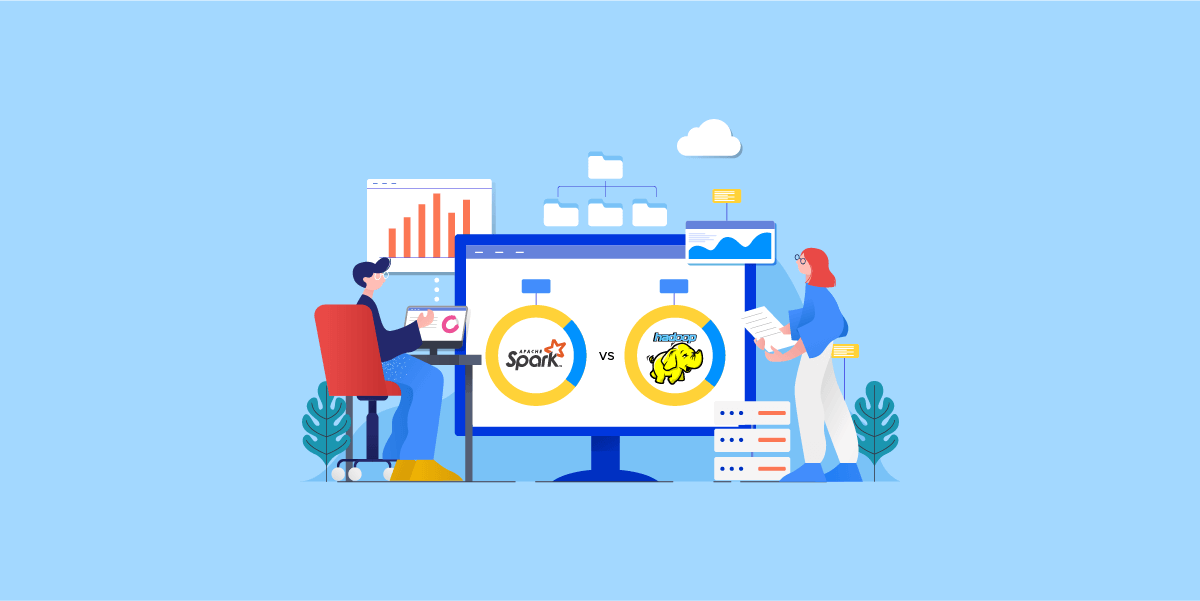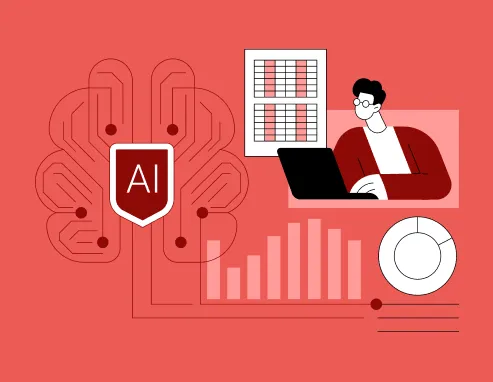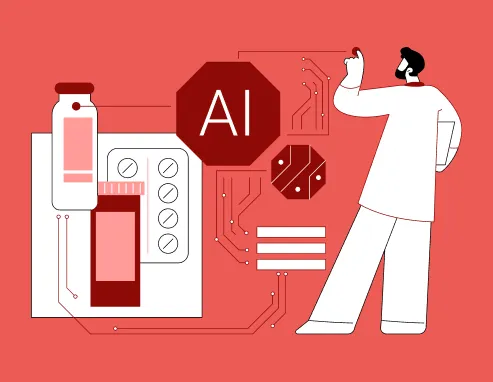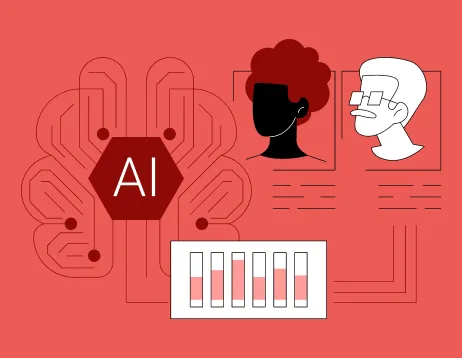- What Does an AI Developer Really Do? (Beyond Just Coding)
- When Do You Need to Hire an AI Developer (and When You Don’t)?
- Skills Matrix: What to Look for in an AI Developer
- Technical Skills
- Domain & Business Understanding
- Soft & Strategic Skills
- Emerging Skills for 2025–2028
- Step-by-Step Process to Hire AI Developers
- Step 1: Figure Out What You’re Building (and If You’re Ready for It)
- Step 2: Decide How You’ll Work Together
- Step 3: Start Looking in the Right Places
- Step 4: Shortlist and Dig In
- Step 5: Talk, Don’t Test
- Step 6: Make Sure They Actually Fit
- Evaluating the Right AI Talent for Your Project
- Cost to Hire AI App Developers
- Cost by Region
- Cost by Project Type
- Hidden & Long-Term Costs
- Measuring ROI When You Hire AI Developers
- The Real Benefits of Hiring the Right AI Developer
- Onboarding and Integrating AI Developers into Enterprise Teams
- 1. Sort Out Data Ownership and Access First
- 2. Set Up a Clear Communication Routine
- 3. Define What Success Looks Like
- 4. Keep Track of the “Why” Behind Every Decision
- 5. Bring Everyone Else Into the Picture
- Common Mistakes to Avoid (and What to Do Instead)
- 1. Hiring Purely on Cost or Coding Skills
- 2. Ignoring the Model Lifecycle and MLOps Maturity
- 3. Neglecting Governance and Explainability
- 4. Rushing Deployment Without Proper Testing or Bias Evaluation
- Future Outlook: What AI Hiring Will Look Like by 2028
- The Rise of New Roles: AI Agents, LLM Developers, Ethicists & Governance Engineers
- Shift Toward Hybrid, Cross-Functional Roles
- More Focus on Sustainability, Compliance & Ethical Pipelines
- Upskilling & Long-Term Partnerships Over One-Off Hires
- How Appinventiv Helps You Build Your AI Dream Team
- FAQs
Key takeaways:
- AI success starts with people, not just algorithms. The real edge comes from the engineers and developers who turn ideas into working systems.
- Most AI projects fail because of poor execution, not bad tech. The right talent and structure can make the difference between a pilot and a scalable product.
- You don’t always need AI experts, but when you do, timing matters. Bring them in when data and automation become core to your business.
- Great AI engineers balance logic with understanding. They care about business outcomes as much as code accuracy.
- Think of hiring as an investment, not a cost. The money you spend to hire an AI engineer pays back in speed, precision, and long-term growth.
“In the AI era, your success depends less on algorithms and more on the people who build them.”
Enterprises worldwide are accelerating adoption of AI, yet few reach real scale. According to the McKinsey & Company Global “State of AI” survey, about 78 % of organizations now use AI in at least one business function, while only a small minority report meaningful financial impact.
At the same time, research from S&P Global Market Intelligence shows that 42 % of companies abandoned most of their AI initiatives within a year, underscoring the fact that talent, structure and execution are often the limiting factors.
The takeaway for leaders considering whether to hire AI developers or hire AI engineers is simple: talent, structure, and execution and not just technology is what determines the outcomes.
This guide shows you how to hire AI developers and engineers for real-world results, while expaining what to look for, when to hire, the cost to hire an AI engineer, and how to integrate new hires into a compliant, production-grade environment.
What Does an AI Developer Really Do? (Beyond Just Coding)
An AI developer’s job isn’t just about sitting behind a screen and writing lines of code. It’s about turning a business problem into a living, learning system that can think and act on its own. The best profiles you’ll find when you hire AI application developers or hire AI app engineers blend technical depth with business context and governance awareness.
Their work stretches from designing and training models to integrating them with existing tools and ensuring they perform well in real-world conditions. They deal with messy data, test dozens of algorithms, and spend hours fine-tuning results so that the system learns accurately and fairly. Once the model is up and running, they monitor it continuously – checking for errors, drift, or bias, and adjust it as the business grows.
It’s a role that sits right at the intersection of technology and strategy. AI developers work side by side with data scientists, product managers, and engineers, making sure that what’s being built doesn’t just function but also supports business goals and follows compliance norms.
| Role | Focus | Typical Output |
|---|---|---|
| AI Developer | Builds AI systems and weaves them into real products | Smart automation and adaptive apps |
| Data Scientist | Explores data and creates models for insights | Analytical reports and predictions |
| ML Engineer | Handles model deployment and scaling | Production-ready ML pipelines |
| AI Consultant | Defines the broader AI strategy | Technical roadmap and system architecture |
In short: when you hire AI programmers or hire AI ML developers, prioritize builders who understand the why (business KPIs), not just the how (algorithms).
When Do You Need to Hire an AI Developer (and When You Don’t)?
Let’s be honest, not every company needs to hire an in-house AI engineer on day one. Sometimes you just need better data hygiene, a few smart automations, or a tool that can crunch numbers faster. But there’s a moment when that stops being enough, when decisions start piling up faster than your systems can handle, or when manual processes keep dragging your team down. That’s usually the point when an AI developer starts to make sense.
Think of it this way: if your business relies on data to make decisions, say, forecasting demand, spotting fraud, or personalizing customer experiences, someone has to build the intelligence that drives those actions. Off-the-shelf tools can only take you so far. A dedicated AI developer can build something that fits you, not everyone else. They’ll train models on your data, automate what eats up your time, and help your systems actually learn from the patterns they see.
You’ll feel that need more sharply if your company works in a regulated space like healthcare, banking, or logistics. In those worlds, mistakes don’t just cause bugs — they cause fines, compliance issues, and lost trust. An AI developer who knows the rules can save you a lot of cleanup later.
So here’s a simple gut check that will tell you it’s time to hire AI app developers (or hire dedicated AI developers for critical paths):
- If automation or prediction sits at the center of your business, it’s time.
- If your prototype is growing into a real product, it’s time.
- If your team is great at development but clueless about model training, it’s time.
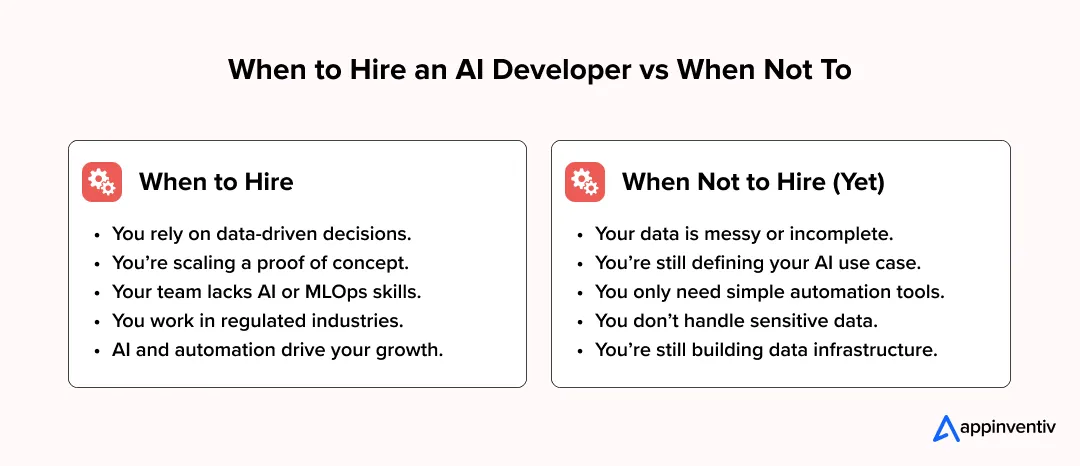
But if your data is still messy, or you’re not sure what problem AI is supposed to solve, hold off. Fix the foundation first. Once that’s in place, bringing in an AI developer won’t feel like a gamble. Or on the other hand, if you’re testing the waters, hire freelance AI engineers for a targeted PoC. However, for long-lived systems touching sensitive data, consider a core team plus a partner.
Skills Matrix: What to Look for in an AI Developer
Finding the right AI developer isn’t about scanning resumes for every buzzword you’ve seen online. It’s about spotting someone who can balance code with context, a person who knows not just how to build AI models, but why they’re being built, and what business impact they’re meant to drive. Below is a practical look at the skills that truly matter, so you can separate the good from the great.
Technical Skills
Let’s start with the obvious: your developer needs to speak the language of machines.
Python is still the backbone of AI, but experience in R, Java, C++, or SQL shows adaptability. The best developers don’t just know how to write code, they know how to make it efficient, reusable, and easy to scale.
Frameworks like TensorFlow, PyTorch, and Scikit-learn are the bread and butter of model building, while tools such as LangChain or Hugging Face are quickly becoming must-haves for projects involving large language models and generative AI.
On the operations side, look for someone comfortable with Git, Docker, Kubernetes, MLflow, and Airflow, tools that keep AI systems stable once they’re live. Real enterprise projects rarely stop at “it works on my laptop,” so experience with AWS SageMaker, Azure AI, or GCP Vertex shows they can handle deployment, versioning, and continuous improvement in production environments.
And one more underrated skill? API integration. An AI developer who can connect models with CRMs, ERPs, or data warehouses will save you weeks of post-launch chaos. If you hire open AI developers or explore Claude AI API integration later, this integration-first mindset accelerates results.
Domain & Business Understanding
This is where many technically gifted developers fall short. AI that doesn’t understand the business it serves ends up as an expensive prototype. You want someone who can look at your KPIs, whether that’s conversion rate, churn reduction, or demand forecasting, and design models that actually move those numbers.
If you’re in healthcare, they should know their way around EHR data and patient privacy rules. In fintech, it’s about handling transactional data securely and staying compliant with KYC/AML regulations. In logistics, they’ll need experience with sensor data, routing algorithms, or predictive maintenance.
A good developer will also understand compliance frameworks like GDPR, HIPAA, PDPL, or DORA, not as a checklist, but as living systems that shape how data can and can’t be used. Knowing all this will help you hire the best AI engineers and machine learning specialists.
Soft & Strategic Skills
You can’t measure these on a résumé, but they often matter the most.
AI projects are rarely solo missions, they sit between business, tech, and design teams. A developer who can explain what a model does (and doesn’t do) without drowning everyone in jargon will make collaboration smoother and reduce friction later.
They should also have a problem-solving mindset, curious enough to ask “why,” not just “how.” That curiosity is what turns a model from an experiment into a product. And finally, awareness of AI governance, bias, and accountability isn’t optional anymore. The best developers think about the human consequences of their systems, not just their accuracy scores.
Emerging Skills for 2025–2028
AI is evolving fast, faster than most hiring cycles. The next few years will see new kinds of developers rise: those who can fine-tune large language models (LLMs), work with multi-agent AI systems, and build products that can make decisions with minimal human input.
You’ll also start hearing more about Edge AI (models running on devices instead of the cloud), federated learning (training AI without moving data), and multimodal systems that combine text, voice, and visuals. Developers who already play in these spaces aren’t just keeping up, they’re building the future.
And through it all, one skill will stay relevant: Responsible AI development, building systems that are explainable, unbiased, and secure. It’s not the flashiest part of the job, but it’s the one that separates sustainable innovation from short-lived hype.
If you plan to hire agentic AI developers or Hire Action Transformer engineers, screen for orchestration and policy guardrails
Step-by-Step Process to Hire AI Developers
Hiring an AI developer isn’t something you tick off a list. It’s more like choosing a teammate who’ll help shape the future of how your company works. There’s no one right formula, but there is a rhythm that helps you avoid costly detours. Here’s what that looks like in real life.
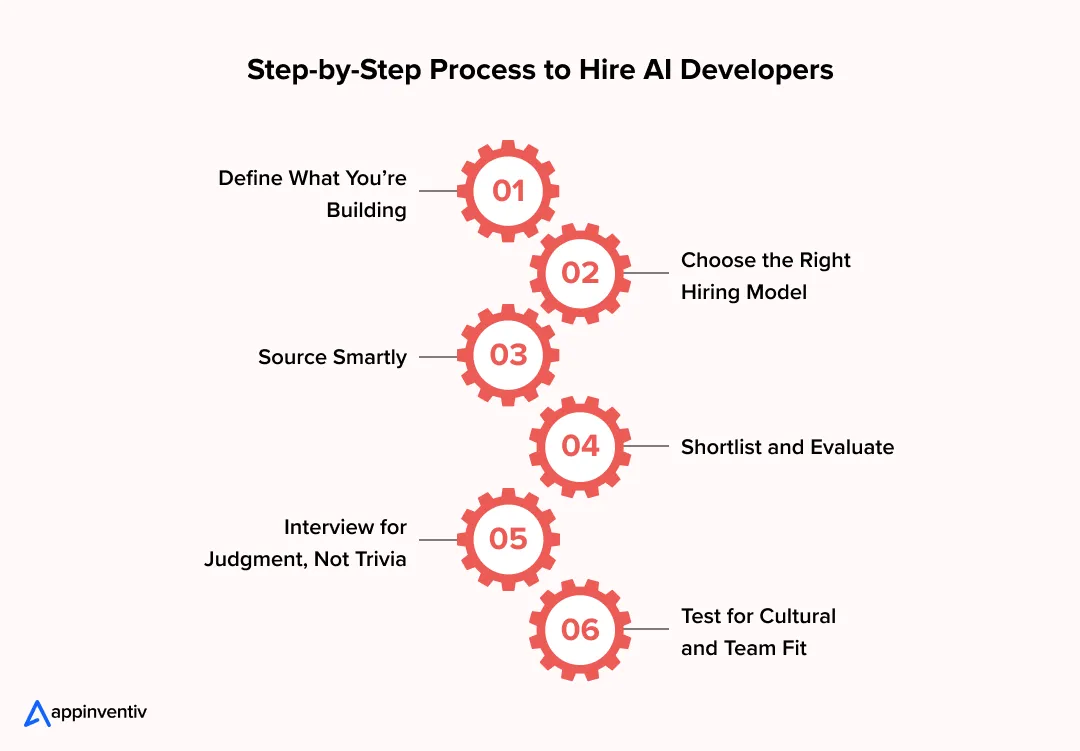
Step 1: Figure Out What You’re Building (and If You’re Ready for It)
Before posting the job, pause. What exactly are you trying to build?
Is it an AI chatbot to make customer service faster, or a predictive analytics system to forecast sales? Maybe it’s something experimental with generative AI. Each goal needs a different type of developer.
Then, take a hard look at your data. Is it organized? Is it clean? Can you even access it easily? I’ve seen projects collapse not because the model was wrong, but because the data was a mess. The smartest developer can’t fix bad foundations. Spend a week cleaning up first, it’ll save you months later.
Step 2: Decide How You’ll Work Together
Once you’re clear about what you want to build, the next big decision is how to build it. You can hire someone in-house, bring in a freelancer, or partner with an experienced tech firm. Each option has its place, but if your goal is to launch something that actually scales, partnering with a seasoned team often saves you more time, money, and headaches than you’d expect.
| Model | Best For | Pros | Watch Out For |
|---|---|---|---|
| In-House Team | Companies building a long-term AI Centre of Excellence | Full control, deep collaboration, IP ownership | High hiring cost, takes months to assemble |
| Freelancer | Small prototypes or quick internal pilots | Fast onboarding, low short-term spend | Limited bandwidth, inconsistent quality |
| Tech Partner/Agency | Mid-to-large enterprises and funded startups that need reliable, scalable AI delivery | End-to-end expertise – from data prep to deployment; cross-functional team already in place; enterprise-grade security and compliance; faster time-to-market | Requires clear project scope and communication |
If you’re experimenting, freelancers are fine for testing an idea.
But when your project touches sensitive data or customer-facing systems, you need a partner who already has the muscle, which means data scientists, ML engineers, MLOps specialists, and compliance experts working in sync.
Think of it like this: the more your business depends on AI, the more stable your team structure should be.
Step 3: Start Looking in the Right Places
LinkedIn is obvious, but dig deeper.
Check GitHub to see what people are actually building. Kaggle is full of developers who treat data like a sport and that’s a good sign. Platforms like Toptal can help if you need someone vetted.
If you’re a mid-to-large enterprise, it might make more sense to partner with a firm that already has an AI department, someone like Appinventiv or any team that can plug in data scientists, ML engineers, and MLOps experts without you hiring each role separately.
Don’t just skim their titles. Look at what they’ve built that’s still running. Longevity says more than any certification.
Step 4: Shortlist and Dig In
Once you’ve got a few names, dig into their work. Ask for real examples, code samples, dashboards, anything live. Pay attention to how they describe challenges. If they say, “it just worked,” they probably didn’t lead the project.
Red flags?
- They’ve never deployed anything beyond a notebook.
- They can’t explain how their models integrate with existing systems.
- Documentation is missing or messy.
Shortlist the people who can balance curiosity with accountability, folks who care about both accuracy and how the business uses their work.
Step 5: Talk, Don’t Test
Forget trick questions or whiteboard math. Instead, give them a situation.
“What would you do if a healthcare model starts showing bias in predictions?”
Or, “Our model works in a test but breaks with live data, where would you look first?”
You’ll see their thought process unfold. That’s what matters. You’re hiring for judgment, not recall.
If you really want a practical test, hand them a small messy dataset and ask what they’d do first. The best developers will start by asking questions, not coding.
Step 6: Make Sure They Actually Fit
Technical skills can be taught. Fit cannot.
AI projects touch marketing, product, operations and everyone else in between. You need someone who can translate technical ideas into plain English. Someone patient enough to explain without showing off.
A small trick: have them explain a past project to someone non-technical on your team. If that person walks away saying, “I get it,” that’s your person.
And finally, trust your gut. If a candidate is brilliant but arrogant, or brilliant but hard to follow, the project will suffer. AI work already has enough moving parts; you don’t need ego adding more.
In short: If you are still unsecure, how to hire AI developers or how to hire AI engineers, just understand it’s about finding a curious problem-solver who speaks both code and business. Someone who can build today and still adapt to what’s coming next year.
Collaborate with top AI app developers to turn your idea into a smart, scalable solution that grows with your business.
Evaluating the Right AI Talent for Your Project
Hiring the wrong AI professional can set your project back months, or worse, derail it entirely.
That’s why evaluation is just as important as recruitment. When you set out to hire AI engineers or hire AI app developers, you’re not just looking for people who can code, you’re looking for partners who understand compliance, scalability, and business logic.
Here’s how leading enterprises ensure they choose the right fit:
- Rigorous Candidate Screening
Begin with a structured screening and matching process using deep-vetting platforms or internal HR frameworks. Go beyond resumes, look for real-world experience in model deployment, data integration, and MLOps. Use real-time reporting tools to track performance across rounds and spot consistency early.
- Real-World Technical Assessments
Instead of abstract coding puzzles, run a technical test or test project that mirrors your business scenario like optimizing a model for speed or ensuring bias-free predictions.
A seniority assessment test helps you see how a candidate thinks about architecture, scalability, and versioning, not just syntax.
- Soft Skills and Collaboration Check
When you hire AI engineers, ensure they can communicate beyond jargon. A language and personality evaluation helps you find developers who can collaborate smoothly across data, design, and business teams. This is essential for any AI product that impacts multiple departments.
- Compliance and Risk Verification
Before you hire AI app developers, run compliance checks with Vision AI or similar automated tools. These flag potential gaps in data handling, documentation, and ethics. Combine that with project risk prediction tools to assess whether the developer’s prior experience aligns with your security and governance standards.
- Multi-Level Technical Interviews
Finally, organize technical rounds that mix problem-solving with strategic thinking. Ask candidates how they’d monitor drift, document bias, or handle model failure in production.
Developers who challenge assumptions, rather than simply follow instructions, are the ones who build reliable, explainable AI systems.
Cost to Hire AI App Developers
Talking about cost is tricky, especially with AI, where the price tag can vary wildly depending on what you’re trying to build. Some companies hire remote AI developers to test an idea; others bring in a full team and hire top AI developers to power a mission-critical product. The truth is, hiring an AI developer isn’t a fixed cost, it’s an investment that scales with complexity.
That said, it helps to have a ballpark idea of what you’re getting into. Here’s what the landscape looks like:
Cost by Region
Rates vary depending on where your developer sits, how complex your project is, and the kind of experience you’re looking for. Developers in the US and Western Europe usually charge more, but they also bring deep exposure to enterprise systems and compliance-heavy industries. Teams in India and the Asia-Pacific region offer strong technical skills and faster turnaround times, often at a more flexible cost.
| Region | Hourly Rate | Monthly Range |
|---|---|---|
| North America | $80–$200/hr | $12K–$32K |
| Western Europe | $60–$150/hr | $9K–$24K |
| APAC / India | $30–$70/hr | $5K–$10K |
For most companies, regional cost differences come down to priorities. If you’re early-stage or testing an idea, outsourcing makes more sense than hiring a full in-house team. Once your AI product starts taking off, you can always build a local team around it.
Cost by Project Type
AI projects don’t fit neatly into one price tag. The cost depends on the size of your data, how many features you want, and how complex the use case is.
| Project Type | Cost Range | Timeline |
|---|---|---|
| MVP / Proof of Concept | $40K–$70K | 4–8 weeks |
| Mid-Level AI Solution | $80K–$150K | 2–4 months |
| Enterprise-Grade AI Platform | $200K–$400K+ | 6–12 months |
A simple proof of concept, like a chatbot that automates routine queries might fall around the $40K mark. As you move toward custom-built systems that connect multiple departments, handle sensitive data, or include advanced automation, the cost climbs closer to $400K and beyond.
The key is to scale wisely. Start with a version that proves value. Once the early numbers look promising, expand it step by step. That way, your money is always tied to progress, not guesswork.
Hidden & Long-Term Costs
This is where most budgets slip. Building an AI system is one thing; keeping it sharp is another. Models don’t just run forever, they need care, updates, and recalibration.
- Cloud infrastructure: You’ll need servers for training, testing, and deployment. These costs grow with your data.
- Model maintenance: AI learns from patterns, and patterns change. Retraining keeps predictions accurate over time.
- Security and governance: The more data you use, the more protection it needs. Regular audits and monitoring prevent trouble later.
- Change management: Teams need to understand how to work with the new system. That means training, documentation, and some patience.
Think of these as the quiet costs that protect your bigger investment. When they’re handled well, your AI project becomes easier to scale and far more stable in the long run.
Measuring ROI When You Hire AI Developers
AI shouldn’t feel like another expense, it should earn its keep. The real question isn’t “How much will it cost to hire AI developers?” but “What will it save or create in return?”
Think of it this way:
- Start with the pain
What’s slowing you down today? Maybe your support team spends half their day answering repetitive queries, or your operations team still runs forecasts in Excel. That’s your baseline cost (including the effort, time, and money your business burns just to keep up). - Imagine what changes with AI
Now picture those same tasks handled by systems that never take a break. AI models that predict demand, chatbots that learn from every customer interaction, or algorithms that spot risks before they hit. The value starts adding up fast right? Fewer errors, faster turnarounds, happier teams. - Look at the bigger picture
The best part about AI? It compounds. Once you set it up right, it keeps learning and improving, without needing more hours or people. Every week, the system gets sharper, and your returns keep growing.
Here’s what that looks like in numbers:
One of our clients invested around $150K to hire an AI app development team. Within a year, they’d saved nearly $500K by automating repetitive workflows. But what mattered even more was how their people got time back to innovate instead of firefight.
That’s the real ROI of AI, time, clarity, and the freedom to focus on what moves your business forward.
AI isn’t cheap, but it pays for itself when built right. A good developer or team won’t just give you a product, they’ll give you a system that keeps learning and improving long after the first version ships.
The Real Benefits of Hiring the Right AI Developer
When you bring in the right AI developer, you’re not just hiring a tech expert. You’re adding someone who helps your business work smarter, move faster, and grow with confidence.
- Faster Time to Market: Developers who’ve built AI products before know where projects get stuck: messy data, unclear goals, endless testing. They’ve been there. They know how to fix it early. That experience helps your product reach the market quicker and with fewer surprises.
- Systems That Grow With You: A good AI developer doesn’t build for today; they build for what’s next. As your data grows and your customer base expands, your system should handle it smoothly. A scalable foundation keeps your app stable no matter how fast your business moves.
- Clear Return on Investment: The best AI engineers care about outcomes, not just output. They’ll connect every model they build to something that matters, saving time, cutting costs, or improving how you serve customers. You’ll see results that actually move the needle.
- A Competitive Edge That Lasts: AI is shaping every industry, but most companies still treat it as an add-on. With the right developer, you can turn it into your strength. Smarter personalization, faster decision-making, smoother workflows things that make your brand stand out.
- Lower Long-Term Costs: Fixing broken models or rebuilding code later can be expensive. Skilled developers do it right the first time. They write clean, reliable code that’s easier to update, saving you money and stress in the long run.
- Better Collaboration Across Teams: Great developers don’t just talk about algorithms. They explain things simply how the system works, what to expect, and where it’s headed. That makes collaboration easier across departments and builds trust around the project.
Onboarding and Integrating AI Developers into Enterprise Teams
Bringing an AI developer on board isn’t just about giving them a laptop and a welcome email. It’s about helping them plug into your system, your data, your teams, and your culture, so they can actually build something that lasts. Most AI projects don’t fail because the developer wasn’t skilled; they fail because no one set them up to succeed. Integration takes time, communication, and a bit of patience.
For companies still figuring out how to hire the right AI app developer, this onboarding phase is often the missing piece. Even the best hire won’t deliver impact if they’re dropped into chaos without data access, clear metrics, or collaboration structures.
Here’s how to make that process work in real life.
1. Sort Out Data Ownership and Access First
The first few weeks of an AI project often get wasted just figuring out where the data is. So, before your new developer even starts coding, make sure they know who owns the data, where it lives, and how to get it. It sounds simple, but in large teams, this can be a maze of approvals and outdated databases.
Give them access early, the right folders, dashboards, and documentation. It keeps momentum going and prevents the frustration that comes from waiting weeks just to explore datasets.
When you hire data engineers, this step becomes even smoother because they are trained to map data flows quickly and remove access bottlenecks. Their structure and discipline ensure the entire AI project starts on solid ground instead of confusion.
2. Set Up a Clear Communication Routine
AI developers work best when they understand the business side of the project, not just the tech specs. Make sure they have regular check-ins with both technical leads and product owners. A short weekly sync is often enough to keep things on track.
Let them ask questions. Let them challenge assumptions. Sometimes the best insights come when a developer asks, “Why are we doing it this way?”
3. Define What Success Looks Like
Don’t assume everyone knows what “done” means.
For some, it’s model accuracy; for others, it’s how fast the model can go live or how much time it saves the team. Pick 2–3 metrics that matter and make them visible to everyone.
When an AI developer knows exactly how their work connects to real results. Whether it’s improving forecasts or cutting manual effort, they’ll naturally focus on what delivers value.
Whether you work with in-house teams or hire offshore artificial intelligence developers, your goal should be the same; align them early with your processes, governance policies, and business goals. That’s what turns a capable developer into a long-term strategic asset.
4. Keep Track of the “Why” Behind Every Decision
AI systems age like milk if no one remembers how they were built. Every assumption, from data filters to algorithm choice, should be written down somewhere. Not because you need a manual for everything, but because projects evolve, and six months later, no one remembers why something was done a certain way.
Good documentation saves you from repeating the same mistakes and helps new people catch up faster. Think of it as your AI project’s memory.
5. Bring Everyone Else Into the Picture
AI isn’t a tech-only project. It touches marketing, sales, compliance, operations, everyone in some way. Before launch, gather stakeholders, explain what’s coming, and let teams ask questions.
Sometimes, people fear AI because they don’t understand it. A simple walkthrough or demo helps clear that up and builds trust. Once people see how it makes their jobs easier, they’ll stop worrying about it replacing them and start finding ways to make it even better.
In short: Onboarding an AI developer isn’t about getting them “up to speed” — it’s about helping them find their rhythm inside your company. When you give them access, structure, and real collaboration, they’ll do far more than code. They’ll help your teams think smarter, move faster, and see opportunities that are hiding in plain sight.
Common Mistakes to Avoid (and What to Do Instead)
Even the most ambitious AI projects stumble when the basics are ignored.
It’s not the technology that usually fails, it’s the decisions made around it. From rushing to hire the cheapest option to skipping critical testing, these mistakes quietly drain time, money, and trust. Here’s what to watch for and how to fix it before it snowballs.
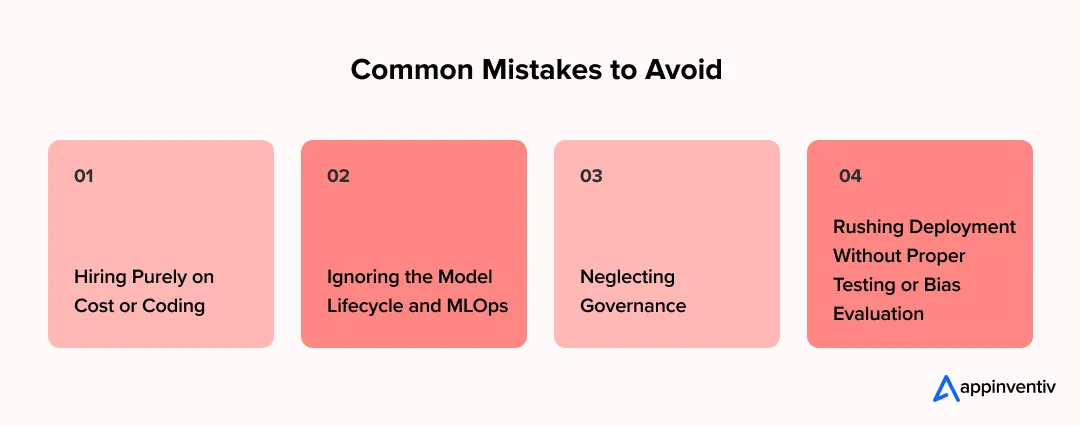
1. Hiring Purely on Cost or Coding Skills
The mistake: Companies often hire the cheapest available developer or someone with great coding skills but zero understanding of business context. It feels efficient at first, until the team realizes the developer built something that technically works but adds no real value.
The fix: Hire for balance. Look for developers who can connect code to business goals. Look for people who ask why before they start building. They might charge more, but they’ll save you thousands later by avoiding rework and misalignment.
2. Ignoring the Model Lifecycle and MLOps Maturity
The mistake: Many teams treat AI development like a one-time project, train the model, deploy it, and move on. But AI systems don’t work that way. Data changes, users evolve, and models drift. Without proper pipelines for updates and monitoring, your AI becomes obsolete within months.
The fix: Plan for the full lifecycle from day one. Build a process for versioning, retraining, and measuring ongoing performance. Even simple MLOps tools like MLflow or Kubeflow can keep your systems alive and learning instead of decaying silently in the background.
3. Neglecting Governance and Explainability
The mistake: AI that’s powerful but unexplainable is a liability, especially for enterprises working under compliance frameworks like GDPR or HIPAA. Too often, teams deploy models that no one outside the dev group can explain or audit. That’s how trust and credibility erode.
The fix: Make transparency part of the build process. Document how decisions are made, record what data was used, and keep bias checks visible. Use dashboards or explainability tools so business leaders can actually see how models arrive at predictions. When users trust the system, adoption follows naturally.
4. Rushing Deployment Without Proper Testing or Bias Evaluation
The mistake: In the rush to “go live,” teams sometimes skip testing. They push models into production without enough validation, and that’s where the real damage happens. Biased recommendations, wrong predictions, or unstable APIs can all destroy user trust overnight.
The fix: Slow down before you scale up. Always run pilot testing with real-world data, not just clean training samples. Check the model across multiple user groups to spot hidden biases early. A few extra weeks of validation can save months of brand damage control.
Final Thought: AI projects don’t fail because people aren’t smart enough, they fail because teams forget to connect the dots between technology, business, and governance. Avoiding these four mistakes isn’t just about saving money; it’s about building AI that lasts, scales, and earns trust across the organization.
Future Outlook: What AI Hiring Will Look Like by 2028
Let’s take a quick look ahead, not because getting it exactly right matters, but because where your hiring strategy is today will define what your team looks like in a few years. The AI-job landscape is shifting fast, and your next hire should feel like an investment into that future, not just your current project.
The Rise of New Roles: AI Agents, LLM Developers, Ethicists & Governance Engineers
Ten years ago you rarely heard “AI agent developer” or “AI ethicist” at job fairs. By 2028, companies will be hiring people whose job isn’t just “build a model” but “build AI that lives, evolves and plays nice with people.”
- We’ll see roles like LLM Developer (someone who’s deep into large-language-model fine-tuning, prompt engineering and the quirks of generative systems).
- AI Agent Engineer: building AI agents or systems that act on their own, across workflows, what Microsoft calls “agent bosses” managing AI helpers.”
- AI Governance & Ethics Specialist: People who understand data bias, audit trails, model AI explainability, and compliance frameworks.
So when you’re hiring now, keep an eye open for signs that the candidate is ready, or at least excited to step into those kinds of roles.
Shift Toward Hybrid, Cross-Functional Roles
In the old days you might separate “data scientist,” “ML engineer,” and “business analyst” into distinct buckets. By 2028, we’re going to see many more hybrid roles, people who know their domain (finance, healthcare, logistics) and know AI, not just “someone we teach AI later.”
Research backs this: a study found demand rising for “AI-complementary skills” like teamwork, domain knowledge and digital literacy, not just raw coding power.
So when you hire, look for someone who doesn’t just code in the lab but says things like: “In logistics, we used sensor data to drop downtime by 20%. Then we added a self-learning model.” Those stories matter.
More Focus on Sustainability, Compliance & Ethical Pipelines
The spotlight on AI isn’t just tech anymore, it’s governance, energy use, data rights, trust. According to a review of how AI will shape sustainability and jobs, the tech is set to majorly impact climate, job structure and ethical questions.
By 2028, enterprises will expect:
- AI systems that can show: “Here’s how we handle bias, here’s how we’re ensuring uptime, here’s how we’re auditing decisions.”
- Teams who factor in carbon cost, model retraining overhead, data leak risk, privacy regulations, not as afterthoughts, but as part of the plan.
Hire someone who brings the mindset: “Yes, I can build it and yes, I can monitor it, explain it, and keep it compliant.”
Upskilling & Long-Term Partnerships Over One-Off Hires
Here’s the practical bit: you’re not just hiring today’s role. You’re hiring someone (or a team) you’ll rely on for 3-5 years. Given how fast AI shifts, you’ll want people who want to keep learning, not someone who’s “done their ML degree and now settled.”
Reports show employers are keenly aware of this: from 2025 to 2030, many companies expect job change, skill transformation, not simply new roles. So in your hiring process, ask:
- What do you want to learn next?
- How do you stay current with AI advances?
- Have you ever upgraded a model and what did you learn from it?
Choosing a partner with that mindset means you’re not hiring for “the model of 2025” but “the system of 2028 and beyond.”
In short: By 2028, the AI developer of choice won’t just know Python or TensorFlow, they’ll know context, ethics, and long-term strategy. They’ll work across teams, talk business and code in the same breath, and build systems that don’t just launch fast but live long. If your hiring today takes this future into account, you’ll be ahead, not catching up.
How Appinventiv Helps You Build Your AI Dream Team
Finding the right AI talent isn’t just about filling roles, it’s about finding people who understand your vision and can turn it into something real. That’s what we do every day at Appinventiv.
We’ve helped businesses around the world hire AI developers and build custom AI development services and solutions that don’t just impress in demos, but deliver results in production. With a team of 1,500+ problem-solvers and over 3,000 successful projects behind us, we know how to bring strategy, technology, and execution together.
You’ve probably seen our work without even realizing it.
- We helped JobGet reshape how people find work through AI-driven job matching.
- We built YouCOMM, a hospital communication app that lets patients request help instantly, powered by intelligent alerts.
- And with Mudra, we made budgeting smarter by predicting and adapting to user spending habits.
So, whether you’re just starting to explore AI or looking to expand an existing platform, we can help you build a team that thinks beyond code, one that understands data, compliance, and business impact.
At Appinventiv, we don’t just help you hire artificial intelligence developers, we help you build the kind of AI team that keeps learning, adapting, and pushing your business forward. Contact us today; your skilled AI developers are just a call away.
FAQs
Q. Why to hire our AI engineers?
A. Our AI engineers bring deep expertise in machine learning, automation, and data-driven product development. They don’t just build models, they align AI with your business goals. Whether you’re exploring how to hire top artificial intelligence engineers or simply need to hire professional AI developers for ongoing innovation, our team ensures quality, speed, and scalability.
Q. How to hire AI engineers who will benefit your firm?
A. Start by defining your goals clearly, automation, predictive analytics, or generative AI, and then look for developers who combine technical depth with business understanding. If you’re unsure how to hire an AI app developer, our experts can guide you through skill evaluation, interviews, and project onboarding to ensure the best fit for your business needs.
Q. How can you hire AI developers on an hourly or project basis?
A. Yes, absolutely. You can hire AI developers on flexible engagement models, hourly, monthly, or for complete project-based tasks. This allows you to scale your development team as needed and pay only for the scope you use. For enterprises experimenting with generative AI, you can also hire AI prompt engineers to fine-tune large language models or custom chatbots efficiently.
Q. How much does it cost to hire an AI developer?
A. The cost to hire an AI engineer varies based on location, experience, and project complexity. On average, small to mid-sized AI projects start at around $40,000 and can scale up to $400,000+ for enterprise-grade platforms. If you’re looking to hire a remote AI developer, expect rates between $30 to $150 per hour depending on expertise and geography.
Q. What are the benefits of hiring an AI engineer?
A. The biggest benefits of hiring an AI engineer include faster innovation, process automation, and better decision-making powered by data. Skilled engineers design intelligent systems that not only save costs but also give your organization a competitive edge. They can also guide you on how to hire top artificial intelligence engineers for future projects.
Q. Why hire artificial intelligence developers from Appinventiv?
A. Appinventiv has delivered 3,000+ AI-powered solutions across industries, blending strategy, engineering, and innovation. When you hire artificial intelligence developers from Appinventiv, you get access to domain experts who’ve built intelligent apps, agents, and automation platforms for leading global brands. Our AI team ensures scalability, compliance, and tangible ROI for every project.
Q. Why partner with Appinventiv to hire AI developers?
A. Partnering with Appinventiv means you don’t just hire AI developers and engineers you gain a full-stack innovation partner. From strategic consulting to post-launch optimization, we handle the full AI lifecycle. Whether you need to hire professional AI developers or hire AI prompt engineers for specialized generative AI work, our team ensures precision, performance, and long-term success.


- In just 2 mins you will get a response
- Your idea is 100% protected by our Non Disclosure Agreement.
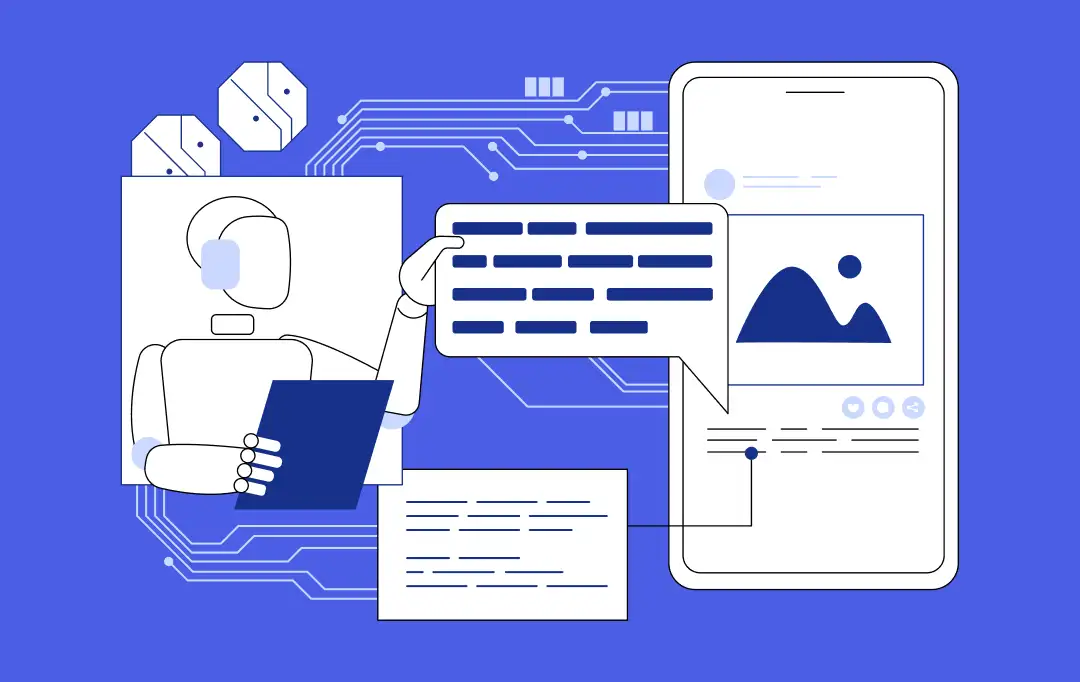
How Much Does it Cost to Develop a Generative AI App?
Key Takeaways The cost of Generative AI application development ranges between $40,000 to $400,000+, depending on complexity, integrations, and security needs. McKinsey reports 64% of companies say AI is driving their innovation, emphasizing the strategic role of generative AI. Choosing the right generative AI model stack and optimizing data governance can significantly reduce project costs…
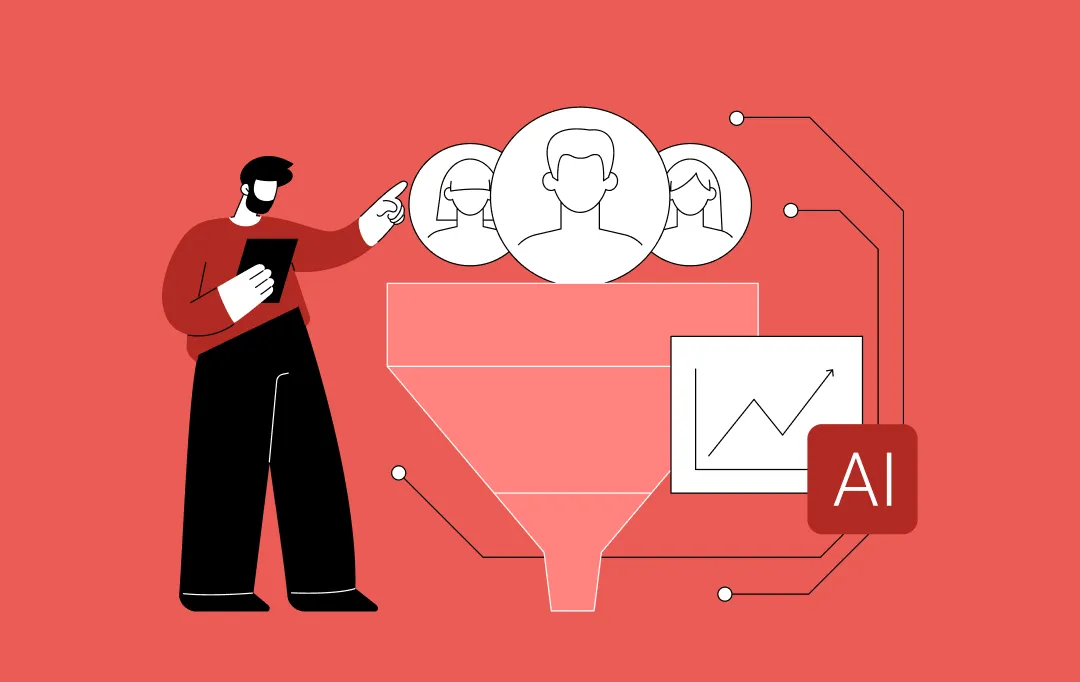
Hiring an AI Development Partner in the UK: A Strategic Enterprise Guide
Key takeaways: AI initiatives fail more often due to delivery, governance, and integration gaps than model limitations. Choosing the right AI partner is a business decision, not just a technical one. Production experience, data engineering maturity, and UK regulatory awareness matter more than innovation claims. Clear scope, realistic budgeting, and early governance involvement reduce rework…
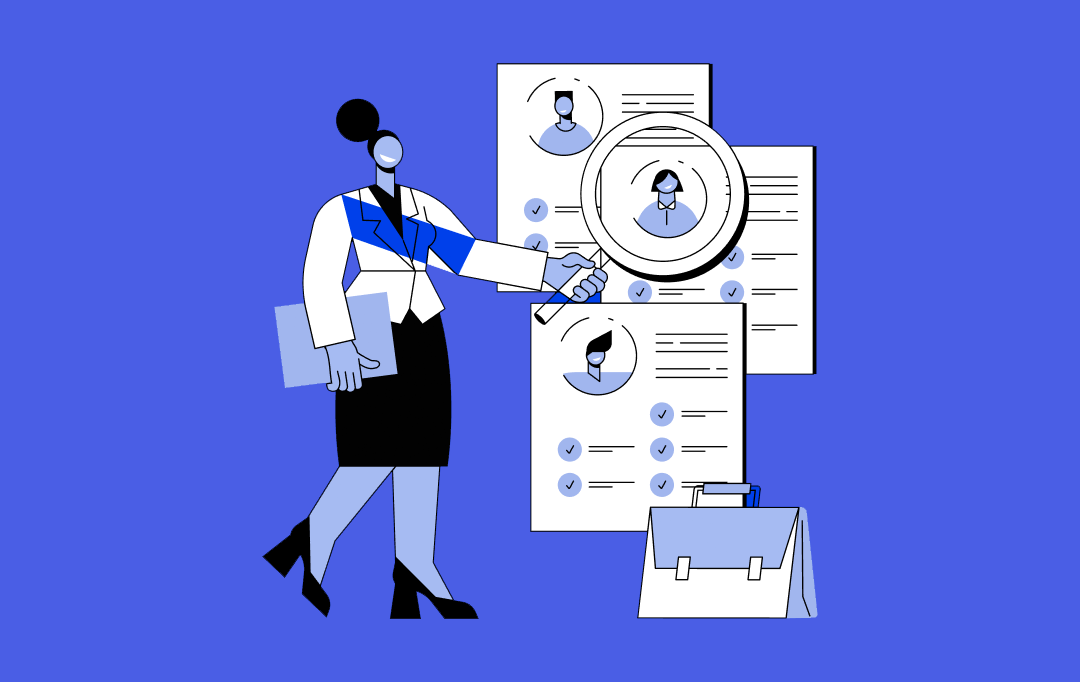
How to Hire AI Developers in Australia?
Key takeaways: Australian AI developers offer world-class expertise, especially in industries like healthcare, finance, and retail, to help organizations implement AI solutions without any difficulties. Hiring AI developers in Australia offers access to seasoned professionals who have knowledge of AI integration, machine learning, and compliance with global data protection laws. The recruitment cost of AI…

























